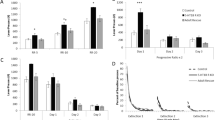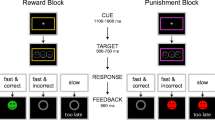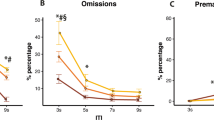Abstract
Rationale: Altered serotonergic and dopaminergic function have been widely implicated in behavioural disorders associated with impulsivity and risk-taking. However, little research has addressed the specific cognitive consequences of changed monoaminergic function that might contribute to the production of impulsive behaviour. Objectives and methods: We compared the effects of rapid plasma tryptophan depletion, acute doses of the mixed indirect catecholamine agonist, methylphenidate (40 mg), and acute doses of the α1/α2 agonist, clonidine (1.5 µg/kg), on aspects of visual discrimination learning involving either acquisition of altered stimulus-reward associations (i.e. updating the affective valence of exteroceptive stimuli) or the control of attention towards relevant as opposed to irrelevant stimulus dimensions. Results: Relative to subjects who received placebo, subjects with reduced tryptophan exhibited a deficit in the ability to learn changed stimulus-reward associations, but were still able to shift an acquired attentional set away from a now-irrelevant stimulus dimension towards a newly relevant dimension. By contrast, subjects who received methylphenidate were able to learn effectively about changing stimulus-reward associations, but showed an enhanced ability to shift an attentional bias, in combination with slowed response times. Subjects who received clonidine showed neither of these changes. Conclusions: These results suggest that reduction in central serotonin leads to altered neuromodulation of the cortical and subcortical regions (e.g. orbitofrontal cortex, striatum and anterior temporal structures) that mediate important aspects of associative learning whereby exteroceptive stimuli acquire altered incentive motivational value. On the other hand, facilitation of catecholamine neurotransmitters may disrupt the allocation of attention between relevant and irrelevant features of the environment, perhaps through altered modulation of the dorsolateral prefrontal cortex. The implications of these results for understanding the differential neuromodulation of cognitive functions are discussed.
Similar content being viewed by others
Author information
Authors and Affiliations
Additional information
Received: 11 May 1999 / Final version: 29 June 1999
Rights and permissions
About this article
Cite this article
Rogers, R., Blackshaw, A., Middleton, H. et al. Tryptophan depletion impairs stimulus-reward learning while methylphenidate disrupts attentional control in healthy young adults: implications for the monoaminergic basis of impulsive behaviour. Psychopharmacology 146, 482–491 (1999). https://doi.org/10.1007/PL00005494
Issue Date:
DOI: https://doi.org/10.1007/PL00005494




